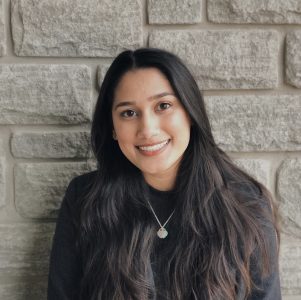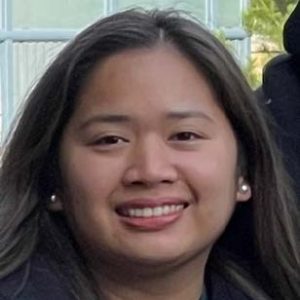Written by: Joyce Teodoro, PhD Student, Ma Lab (left) and 
 Kiran Toor, Masters Student, Brown Lab (right)
Kiran Toor, Masters Student, Brown Lab (right)
Edited by: Kaitlyn Chuong, CBR Admin

Registration table at the Norman Bethune Symposium.
On April 18th 2024, the Centre for Blood Research (CBR) held their 12th annual Norman Bethune Symposium, a renowned research event that gathers scientists, clinicians, healthcare professionals, and trainees to discuss advancements in the field of blood research. The symposium was held at UBC Robson Square, on the traditional territory of the Musqueam, Squamish and Tsleil-Waututh people.
The full day event consisted of expert talks on thalassemia, thrombocytopenia, sickle cell disease, and other bleeding disorders. Research trainees delivered impressive presentations on innovative topics including engineering cells for cancer immunotherapy and computational approaches to inhibit Klebsiella pneumoniae. The event showcased nearly 30 trainee research posters, demonstrating the breadth of ongoing research.
CBR Director, Dr. Ed Conway, began with the opening remarks, followed by the presentation by Dr. Christian Kastrup, Professor at the Medical College of Wisconsin and Senior Investigator at Versiti Blood Research Institute. Dr. Kastrup’s presentation focused on his work on genetically modifying transfusable donor platelets using mRNA-lipid nanoparticles. Following this, there were a series of presentations on the topic of bleeding disorders. It was a research-filled day that honored the contributions of Drs. Don Brooks and Dana Devine.
Blood Research & Reflections:
The symposium was an amazing opportunity to learn about the exciting advances in blood research. It also served as a great platform for speakers to share their personal experiences with blood disorders, as well as for scientists to discuss their professional path in blood sciences.

Ritika Rakshit sharing her journey.
Attendees were fortunate to hear Ritika Rakshit share her personal journey with thalassemia, a genetic blood disorder characterized by the body’s inability to produce enough hemoglobin. She detailed her experience from being diagnosed to her treatment plans including being on extramedullary hematopoiesis (EMH) and switching to luspatercept. She offered insights into her hesitancy to switch medications and highlighted the invaluable support of her clinical team. Ritika continues to be an advocate for thalassemia in her role on the patient advocacy board. It was an eye-opening opportunity to be able to hear from a patient reflect on their own journey and understand their perspective on living with a blood disorder.

Dr. Geraldine Walsh going over her career path.
Dr. Geraldine Walsh, a development scientist with the Canadian Blood Services (CBS), also gave an insightful talk describing her career path in blood sciences. Drawing from her experiences, she shared several pieces of advice on navigating a career in science. She highlighted the importance of finding work that we are passionate about, building strong relationships, and learning from those around us. Dr. Walsh concluded her talk by encouraging attendees, especially research trainees, to explore various career opportunities, including those that may deviate from the conventional scientific career trajectory.
Celebrating Drs. Don Brooks and Dana Devine:

Dr. Ed Conway with Dr. Stephen Withers (top) and Dr. Cedric Carter (bottom).
One of the highlights of the symposium was the talk by Dr. Cedric Carter, which celebrated Drs. Don Brooks and Dana Devine’s achievements and contributions. Drs. Don Brooks and Dana Devine are two of the founding members of the Centre for Blood Research (CBR). In addition to their significant and impactful contributions to the field of transfusion science and medicine, they have been instrumental in promoting research and developing initiatives through various leadership roles. Dr. Brooks has served as Associate Vice-President, Research at UBC and Founding Director of UBC’s Support Programs to Advance Research Capacity (SPARC). He has also served as a member of the Board of Directors for TRIUMF, Provincial Health Services Authority, and BC Emergency Health Services. Dr. Devine has held numerous leadership positions, which include her role as chief scientist at CBS, director of the CBR, president of the Association for the Advancement of Blood and Biotherapies (AABB), and editor-in-chief of Vox Sanguinis, a transfusion medicine journal. Their dedication and commitment to scientific discovery through research and development serve as inspiration for future generations of scientists.
Inaugural Don Brooks and Dana Devine Transfusion Science Innovation Address:
In honour of Drs. Don Brooks and Dana Devine’s scientific contributions to advancing transfusion science and medicine, the inaugural Don Brooks and Dana Devine Transfusion Science Innovation Address was presented by Dr. Stephen Withers. Dr. Withers, in collaboration with Dr. Jay Kizhakkedathu’s lab, worked on identifying efficient enzymes for cleaving terminal sugar structures on the surface of red blood cells (RBCs), which are responsible for determining blood types. By removing these terminal sugar structures, A and B type RBCs can be converted to the universal donor blood type O, which can increase blood supply for transfusion applications. By screening the human gut microbiome for enzymes that can cleave these terminal sugar structures, they identified a pair of enzymes (FpGalNAc deacetylase and FpGalactosaminidase) that can convert type A to type O blood.
Posters & Awards:

Kaitlyn Chuong (left) and Dr. Georgina Butler (right).
This year, there were 29 posters presented by various graduate trainees, postdoctoral fellows, clinical fellows and research associates! These included members within the CBR, but we also had the pleasure of having presentees come from out of town. Multiple trainees from the University of Alberta, University of Toronto & Queen’s University were able to attend the symposium with the support of the CBR Travel Award. The Best Poster Presentation went to Dr. Georgina Butler from the Overall Lab for their poster on “SARS-CoV-2 main protease 3CLpro (nsp5), regulates the formation of tunnelling nanotubes by coordinating cytoskeleton reorganization.” Our final speaker was Dr. Ed Pryzdial with an exciting talk on Dengue virus-induced thrombocytopenia. Afterwards, a reception was held and attendees got to network and socialize with each other to celebrate the end of another incredible symposium!
A huge thank you to everyone who attended, to our speakers and all presenters!

The Centre for Blood Research would like to thank their event sponsors, without whom the 12th Annual Norman Bethune Symposium would not have been possible: the Naiman-Vickars Endowment Fund, Canadian Blood Services, Novo Nordisk, GRIFOLS, CSL Behring, ALEXION, Sobi and Pfizer.








